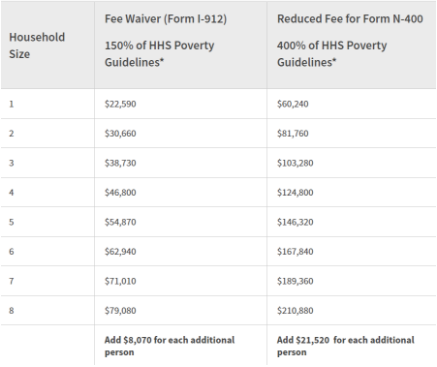El USCIS cambia el formulario y las tasas para solicitar la naturalización
Click here to read this article in English

USCIS introdujo una tasa reducida de 380,00 dólares para los solicitantes que tienen un ingreso familiar anual inferior al 400% de las Directrices Federales de Pobreza (https://www.uscis.gov/forms/filing-fees/poverty-guidelines).
Los solicitantes que quieran pedir la reducción de la tasa deben responder a la parte 10 de la nueva edición del formulario e incluir documentación justificativa que demuestre que sus ingresos familiares anuales están por debajo del 400% del umbral federal de pobreza. La solicitud de reducción de la tasa debe ir respaldada por una copia de la declaración de la renta federal más reciente de cada miembro de la unidad familiar. Hay otros documentos que pueden presentarse si no se dispone de declaraciones de impuestos, como recibos de nómina, el formulario W-2 reciente y una carta de un empleador que verifique los ingresos actuales del solicitante. El cálculo de los ingresos se realiza en el momento de presentar la solicitud.
Los solicitantes que cumplan los requisitos para la exención total de la tasa pueden presentar el formulario I-912, Solicitud de exención de la tasa. Los tres requisitos para poder optar a una exención completa son: recibir una prestación sujeta a la comprobación de recursos económicos, tener unos ingresos iguales o inferiores al 150% de las Directrices Federales de Pobreza o padecer dificultades económicas extremas.
Para más información sobre los cambios aplicados por el USCIS, visite: https://www.uscis.gov/n-400.
Si usted cree que es elegible para solicitar la Naturalización o si tiene preguntas acerca de su elegibilidad y el proceso, por favor programe una consulta con uno de nuestros abogados con experiencia y estaremos más que encantados de ayudarle.
Este blog no pretende ser una asesoría legal y nada aquí debe interpretarse como el establecimiento de una relación abogado-cliente. Programe una consulta con un abogado de inmigración antes de actuar sobre cualquier información que aquí lea.






